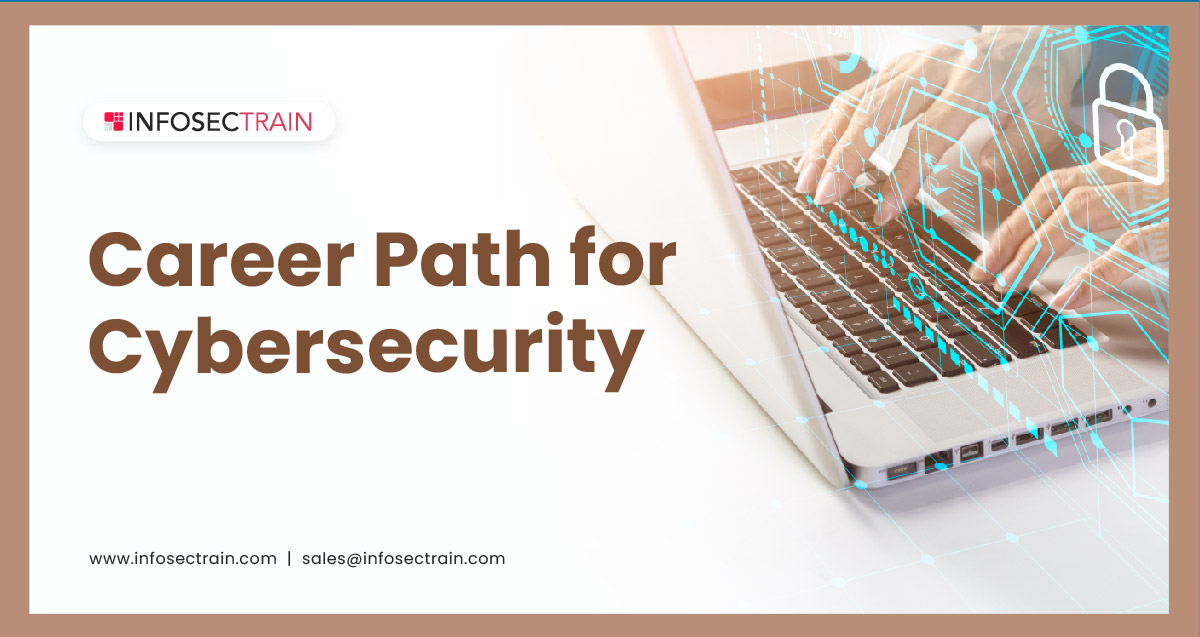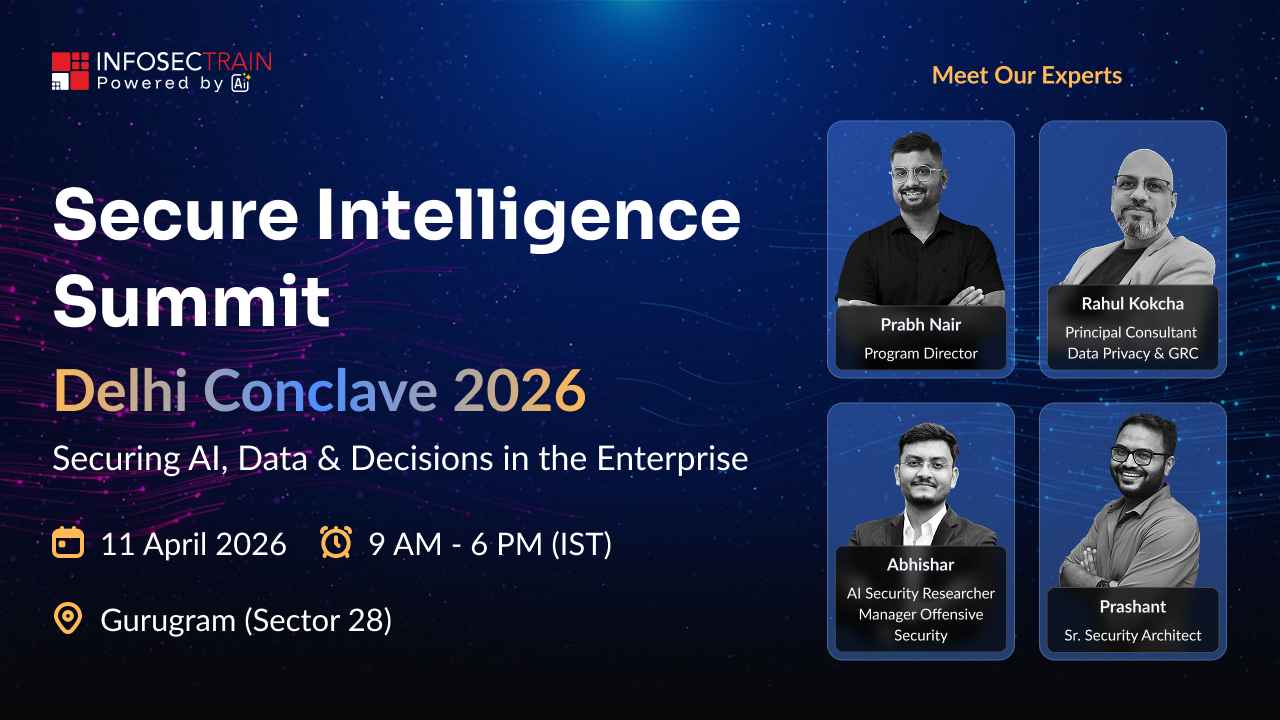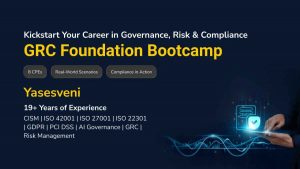Career Path For Cybersecurity
“Promising 100% security is merely a myth.”
In the digital era, most of our data is stored on digital devices, websites, and the cloud. In one way, it helps us achieve a hassle-free and quick service experience, but in another, it has paved the way for cyberattacks. That is why cybersecurity has become a top-level security priority across the globe and has created a massive demand for cybersecurity experts.

Building your career in the cybersecurity domain is the best option for you to pick your profession in multiple roles. For anyone who wants to start or empower a career in the field of cybersecurity, this informative article would help you choose the best suitable certification course to excel in your expertise.
Let’s take a look at different cybersecurity certification courses for various levels.
What is Cybersecurity?
Cybersecurity is a process of implementing various techniques to secure digital components such as networks, servers, data, and systems from unauthorized access. Implementing cybersecurity measures into your digital life helps to combat cyber threats.
Career Path for Cybersecurity
Categorizing cybersecurity into four primary levels:
- Offensive Security
- Defensive Security
- Cloud Security
- Senior Management
Offensive Security
Offensive Security is a field where a person possesses skills that are the same as a hacker in terms of security. Offensive Security can be legal or illegal activity, as it is used to break into the system or find vulnerabilities. For instance, a person works as an Ethical Hacker or a Penetration Tester to find out the vulnerabilities in an organization.
Certifications that come under Offensive Security
1. CEH: Certified Ethical Hacker (CEH) training is a basic course that provides a good understanding of security and offensive security (Hacking) concepts, including types of attacks on mobile, IoT, web, and network.

2. Pentest+: The Pentest+ certification from CompTIA is to evaluate penetration testing and vulnerability assessment skills.

3. Red Team: Red Team course from InfosecTrain aims to understand the tools and techniques used to perform effective penetration testing.

4. Bug Bounty Hunting: The Bug Bounty Hunting program is about finding a bug in the organization’s infrastructure and getting rewarded for every potential bug.

5. Penetration Testing: Any Penetration testing course, such as Network Penetration Testing, Advanced Penetration Testing, Web Penetration testing, etc., helps to get a complete understanding of finding vulnerabilities that leads to exploitation.

6. MITRE ATT&CK: MITRE ATT&CK is a course offered by InfosecTrain to provide an in-depth understanding of implementing adversary tactics, techniques, and procedures (TTPs) to defend against cyber threats.

7. CPENT: Certified Penetration Testing Professional (CPENT) by EC-Council helps to get advanced penetration skills required to perform effective pentest on the enterprise network.

8. WAHS: Web Application Hacking Security course offered by EC-Council provides a good understanding of web vulnerabilities.
Defensive Security
Defensive security is a more extensive field when compared to Offensive Security. In this domain, the security professionals are responsible for detecting, monitoring, and managing the organization’s security controls.
Certifications that come under Defensive Security
1.Security+: Security+ is a fundamental and theoretical course covering all the core security functions and posture required to implement security solutions in the organization. It helps for both offensive and defensive security.
2. CND: Certified Network Defender (CND) certification course from EC-Council is designed to provide fundamental knowledge of networking concepts.
3. Security Operation Center (SOC)
- A. CSA: Certified SOC Analysts (CSA) is a fundamental certification by EC-Council that provides the skills required to detect and respond to security incidents.
- B. SOC Specialist: SOC Specialist training course offered by InfosecTrain to provide advanced SOC architecture and operational knowledge for a SOC Analyst.
4. Incident Handling
- A. ECIH: EC-Council’s Certified Incident Handler (ECIH) is a specialist-level certification program designed to provide skills required to control the impact of a cybersecurity incident.
- B. GCIH: GIAC’s Certified Incident Handler (GCIH) certification course validates the ability to detect, respond, and resolve security incidents.
5. Threat Intelligence and Threat Modeling
- A. CTIA: Certified Threat Intelligence Analyst (CTIA) certification course offered by EC-Council provides skills required to identify and mitigate organizational threats.
- B. Threat Hunting: The Threat Hunting Professional training course by InfosecTrain provides an in-depth understanding of the techniques used to hunt for threats in the network.
6. Organizational courses
- A. IBM QRadar
- B. Splunk
- C. SailPoint
- D. Okta
7. CHFI: EC-Council’s Certified Hacking Forensic Investigator certification accredited by ANSI provides a good understanding of digital forensics, methods, and techniques used for digital investigation over the dark web, cloud, and IoT.
Cloud Security
Cloud is an emerging technology, and It is evident that every organization is shifting towards the cloud to avail the services provided by various Cloud Service Providers (CSPs) such as AWS, Azure, Google Cloud, IBM Cloud, etc.
Certifications that come under the cloud
1. Cloud Vendor Neutral Certifications:
- a. CCSE: Certified Cloud Security Engineer (CCSE) from EC Council to provide vendor-neutral and vendor-specific cloud security concepts. It helps to learn and implement cloud security best practices.
- B. CCSK+: Certificate of Cloud Security Knowledge Plus (CCSK+) by CSA provides a good understanding of cloud computing architecture, framework, operations, and governance to solve cloud security issues.
- C. CCSP: Certified Cloud Security Professional (CCSP) accredited by (ISC)² is an advanced-level of expertise certification that validates the skills to design, manage, and secure data, applications, and cloud infrastructure.
2. AWS Certifications:
AWS Certified Security Specialty is an advanced level of cloud security certification in AWS. It validates the skills required to handle cloud environments and implement best practices.
3. Azure certifications:
AZ-500 Microsoft Azure Security Technologies
Microsoft Azure Security Technologies training program at InfosecTrain helps to achieve a good knowledge of implementing security controls, managing identity and access, maintaining robust security posture, and protecting the data from cyberattacks.
4. GCP Certifications:
Security Engineer
Google Cloud Certified Professional Security Engineer certification validates the skills required to design, develop, manage, and implement secure cloud infrastructure using cloud technologies.
Senior Management
Senior Management is a high-level professional responsible for managing, auditing, and maintaining security compliance. For a person with a minimum of 4-5 years of experience in cybersecurity, these courses are best suited to enhance your career in Senior Management.
Certifications that come under Senior Management
1. CCISO: Certified Chief Information Security Officer (CCISO) is the top-level position in the cybersecurity domain, and EC-Council accredits the certification. It validates the skills required to lead the entire information security program, including policy setting, audit management, executive strategy, and financial expertise.
2. CISSP: Certified Information Systems Security Professional (CISSP) by (ISC)² validates the skills required to design, manage, and implement cybersecurity programs.
3. CISM: Certified Information Security Manager(CISM) is a management-focused certification accredited by ISACA that validates expertise in information security governance, incident management, program development and management, and risk management.
4. CISA: Certified Information System Auditor (CISA) by ISACA enhances the skills required to audit, monitor, control, and assess the organization’s information systems.
5. CSSLP: Certified Secure Software Lifecycle Professional (CSSLP) by (ISC)² enhances the skills required for auditing, authorizations, and authentication on SDLC with the best policies and procedures.
About InfosecTrain
InfosecTrain is the leading global provider of Cybersecurity and Information Security training and consultancy service for all beginners and experienced professionals. It offers instructor-led training for the top-notch certification course that would help you to crack the certification exam in the first go. So, check out our courses and pick a suitable course to enhance your career. Happy learning.






